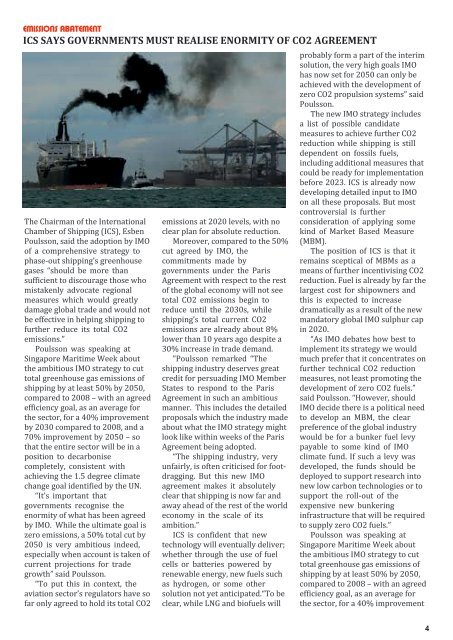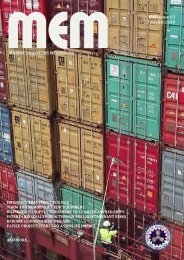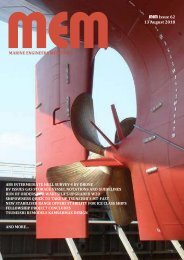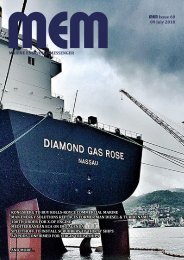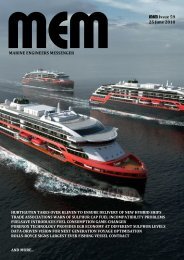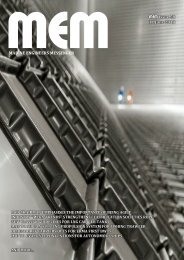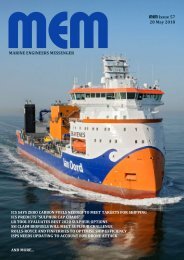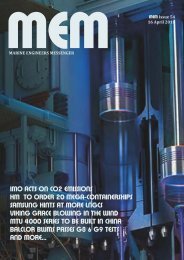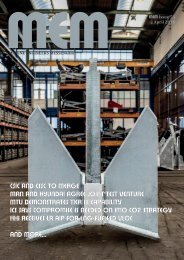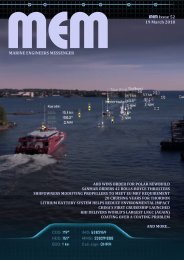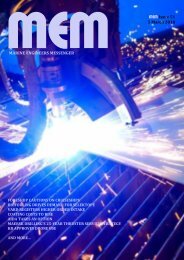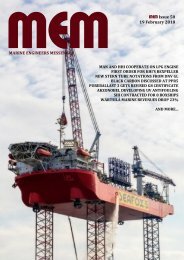Create successful ePaper yourself
Turn your PDF publications into a flip-book with our unique Google optimized e-Paper software.
EMISSIONS ABATEMENT<br />
ICS SAYS GOVERNMENTS MUST REALISE ENORMITY OF CO2 AGREEMENT<br />
The Chairman of the International<br />
Chamber of Shipping (ICS), Esben<br />
Poulsson, said the adoption by IMO<br />
of a comprehensive strategy to<br />
phase-out shipping’s greenhouse<br />
gases “should be more than<br />
sufficient to discourage those who<br />
mistakenly advocate regional<br />
measures which would greatly<br />
damage global trade and would not<br />
be effective in helping shipping to<br />
further reduce its total CO2<br />
emissions.”<br />
Poulsson was speaking at<br />
Singapore Maritime Week about<br />
the ambitious IMO strategy to cut<br />
total greenhouse gas emissions of<br />
shipping by at least 50% by 2050,<br />
compared to 2008 – with an agreed<br />
efficiency goal, as an average for<br />
the sector, for a 40% improvement<br />
by 2030 compared to 2008, and a<br />
70% improvement by 2050 – so<br />
that the entire sector will be in a<br />
position to decarbonise<br />
completely, consistent with<br />
achieving the 1.5 degree climate<br />
change goal identified by the UN.<br />
“It’s important that<br />
governments recognise the<br />
enormity of what has been agreed<br />
by IMO. While the ultimate goal is<br />
zero emissions, a 50% total cut by<br />
2050 is very ambitious indeed,<br />
especially when account is taken of<br />
current projections for trade<br />
growth” said Poulsson.<br />
“To put this in context, the<br />
aviation sector’s regulators have so<br />
far only agreed to hold its total CO2<br />
emissions at 2020 levels, with no<br />
clear plan for absolute reduction.<br />
Moreover, compared to the 50%<br />
cut agreed by IMO, the<br />
commitments made by<br />
governments under the Paris<br />
Agreement with respect to the rest<br />
of the global economy will not see<br />
total CO2 emissions begin to<br />
reduce until the 2030s, while<br />
shipping’s total current CO2<br />
emissions are already about 8%<br />
lower than 10 years ago despite a<br />
30% increase in trade demand.<br />
”Poulsson remarked “The<br />
shipping industry deserves great<br />
credit for persuading IMO Member<br />
States to respond to the Paris<br />
Agreement in such an ambitious<br />
manner. This includes the detailed<br />
proposals which the industry made<br />
about what the IMO strategy might<br />
look like within weeks of the Paris<br />
Agreement being adopted.<br />
“The shipping industry, very<br />
unfairly, is often criticised for footdragging.<br />
But this new IMO<br />
agreement makes it absolutely<br />
clear that shipping is now far and<br />
away ahead of the rest of the world<br />
economy in the scale of its<br />
ambition.”<br />
ICS is confident that new<br />
technology will eventually deliver;<br />
whether through the use of fuel<br />
cells or batteries powered by<br />
renewable energy, new fuels such<br />
as hydrogen, or some other<br />
solution not yet anticipated.“To be<br />
clear, while LNG and biofuels will<br />
probably form a part of the interim<br />
solution, the very high goals IMO<br />
has now set for 2050 can only be<br />
achieved with the development of<br />
zero CO2 propulsion systems” said<br />
Poulsson.<br />
The new IMO strategy includes<br />
a list of possible candidate<br />
measures to achieve further CO2<br />
reduction while shipping is still<br />
dependent on fossils fuels,<br />
including additional measures that<br />
could be ready for implementation<br />
before 2023. ICS is already now<br />
developing detailed input to IMO<br />
on all these proposals. But most<br />
controversial is further<br />
consideration of applying some<br />
kind of Market Based Measure<br />
(MBM).<br />
The position of ICS is that it<br />
remains sceptical of MBMs as a<br />
means of further incentivising CO2<br />
reduction. Fuel is already by far the<br />
largest cost for shipowners and<br />
this is expected to increase<br />
dramatically as a result of the new<br />
mandatory global IMO sulphur cap<br />
in 2020.<br />
“As IMO debates how best to<br />
implement its strategy we would<br />
much prefer that it concentrates on<br />
further technical CO2 reduction<br />
measures, not least promoting the<br />
development of zero CO2 fuels.”<br />
said Poulsson. “However, should<br />
IMO decide there is a political need<br />
to develop an MBM, the clear<br />
preference of the global industry<br />
would be for a bunker fuel levy<br />
payable to some kind of IMO<br />
climate fund. If such a levy was<br />
developed, the funds should be<br />
deployed to support research into<br />
new low carbon technologies or to<br />
support the roll-out of the<br />
expensive new bunkering<br />
infrastructure that will be required<br />
to supply zero CO2 fuels.”<br />
Poulsson was speaking at<br />
Singapore Maritime Week about<br />
the ambitious IMO strategy to cut<br />
total greenhouse gas emissions of<br />
shipping by at least 50% by 2050,<br />
compared to 2008 – with an agreed<br />
efficiency goal, as an average for<br />
the sector, for a 40% improvement<br />
4


